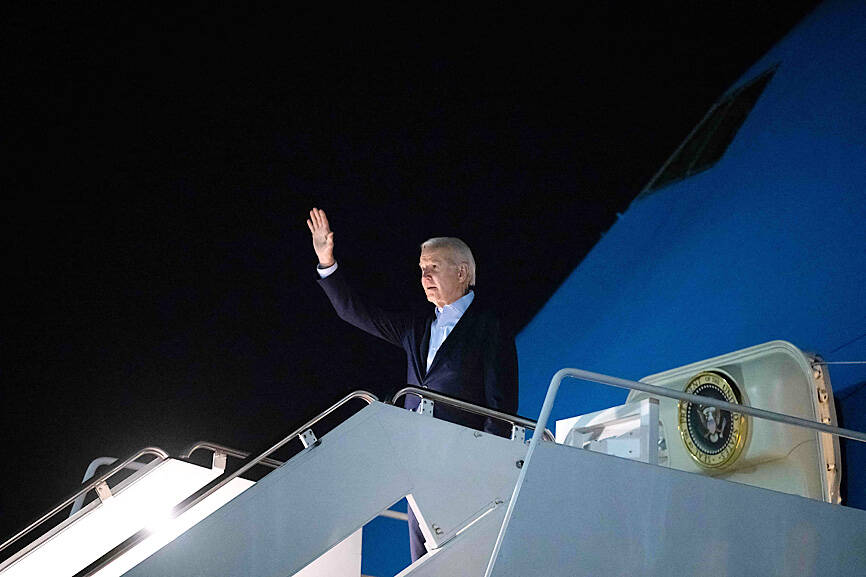US President Joe Biden on Thursday signed into law a US government funding bill for next year that includes provisions to authorize US$2 billion in loans to Taiwan to buy weapons from the US.
Biden, who is on vacation, finalized the US$1.65 trillion Omnibus Consolidated Appropriations Act covering funding for fiscal 2023.
In a news release, the White House said that the “Consolidated Appropriations Act, 2023” makes consolidated appropriations for the fiscal year ending on Sept. 30, 2023, to provide emergency assistance for the situation in Ukraine and for other purposes.

Photo: AFP
The bill, which cleared the US Congress on Dec. 23, provides a record US$858 billion in defense funding — a 10 percent increase over the funding for fiscal 2022 — and US$772 billion in non-defense funding.
In its provisions regarding Taiwan, the act allows up to US$2 billion in direct loans to Taiwan for military purposes under the “Foreign Military Financing Program.”
Taiwan would be required to pay off such loans within 12 years.
However, the bill does not include provisions to provide US$10 billion of grants — US$2 billion over the next five years — for Taiwan to buy US-made weapons, as authorized in the National Defense Authorization Act (NDAA) for Fiscal Year 2023.
The NDAA was signed into law by Biden on Friday last week, but for its funding provisions to be carried out, they must still be approved in the general appropriations act.
The appropriations bill also authorizes funding from the American Institute of Taiwan’s (AIT) budget to support a fellowship program that offers the opportunity for US federal government employees to live and work in Taiwan for two years.
The act states that after consulting with the AIT director, the US secretary of state is required to present an executive plan for the fellowship program to the Committee on Appropriations.
The funds made available by the act are not allowed to “be used to create, procure or display any map that inaccurately depicts the territory and social and economic system of Taiwan and the islands or island groups administered by Taiwan authorities.”

‘DENIAL DEFENSE’: The US would increase its military presence with uncrewed ships, and submarines, while boosting defense in the Indo-Pacific, a Pete Hegseth memo said The US is reorienting its military strategy to focus primarily on deterring a potential Chinese invasion of Taiwan, a memo signed by US Secretary of Defense Pete Hegseth showed. The memo also called on Taiwan to increase its defense spending. The document, known as the “Interim National Defense Strategic Guidance,” was distributed this month and detailed the national defense plans of US President Donald Trump’s administration, an article in the Washington Post said on Saturday. It outlines how the US can prepare for a potential war with China and defend itself from threats in the “near abroad,” including Greenland and the Panama

A magnitude 4.9 earthquake struck off Tainan at 11:47am today, the Central Weather Administration (CWA) said. The hypocenter was 32.3km northeast of Tainan City Hall at a depth of 7.3km, CWA data showed. The intensity of the quake, which gauges the actual effect of a seismic event, measured 4 in Tainan and Chiayi County on Taiwan's seven-tier intensity scale, the data showed. The quake had an intensity of 3 in Chiayi City and County, and Yunlin County, while it was measured as 2 in Kaohsiung, Nantou County, Changhua County, Taitung County and offshore Penghu County, the data showed. There were no immediate reports of

The Chinese Nationalist Party (KMT) is maintaining close ties with Beijing, the Democratic Progressive Party (DPP) said yesterday, hours after a new round of Chinese military drills in the Taiwan Strait began. Political parties in a democracy have a responsibility to be loyal to the nation and defend its sovereignty, DPP spokesman Justin Wu (吳崢) told a news conference in Taipei. His comments came hours after Beijing announced via Chinese state media that the Chinese People’s Liberation Army’s Eastern Theater Command was holding large-scale drills simulating a multi-pronged attack on Taiwan. Contrary to the KMT’s claims that it is staunchly anti-communist, KMT Deputy

RESPONSE: The government would investigate incidents of Taiwanese entertainers in China promoting CCP propaganda online in contravention of the law, the source said Taiwanese entertainers living in China who are found to have contravened cross-strait regulations or collaborated with the Chinese Communist Party (CCP) could be subject to fines, a source said on Sunday. Several Taiwanese entertainers have posted on the social media platform Sina Weibo saying that Taiwan “must be returned” to China, and sharing news articles from Chinese state media. In response, the Mainland Affairs Council (MAC) has asked the Ministry of Culture to investigate whether the entertainers had contravened any laws, and asked for them to be questioned upon their return to Taiwan, an official familiar with the matter said. To curb repeated